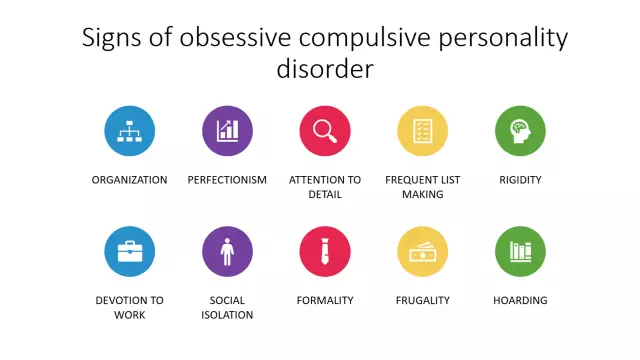- Author Rachel Wainwright wainwright@abchealthonline.com.
- Public 2023-12-15 07:39.
- Last modified 2025-11-02 20:14.
Obsessive compulsive disorder: 10 signs
Obsessive-compulsive disorder (OCD) affects 1% to 3% of people. The predisposition to the disease is largely determined by hereditary factors, but in young children, symptoms are practically not manifested. In most cases, OCD is first diagnosed between the ages of 10 and 30.
Today we will talk about those signs that may indicate a person has obsessive-compulsive disorder.
Frequent hand washing
People with OCD often have an exaggerated fear of infection. Too frequent hand washing is a consequence of the phobia. At the same time, the process is associated with a number of strange actions. For example, a person lathers his palms a strictly defined number of times or wipes each finger from all sides, always in the same order. As a result, a routine hygiene procedure turns into a strictly regulated ritual. The inability to perform all actions in the usual order causes anxiety and irritation in the patient.

Source: depositphotos.com
Excessive pursuit of cleanliness
Exaggeration of the risk of infection with OCD manifests itself as an obsessive desire to clean the premises as often as possible. The patient is constantly experiencing discomfort: all the surrounding objects seem to him not clean enough. If a person washes the floors several times a day, wants to check all surfaces for dust, and unnecessarily uses strong disinfectants, this is an alarming signal.
In some people with obsessive-compulsive disorder, a painful desire for cleanliness is manifested by a fear of touching various objects (for example, the patient refuses to press buttons in an elevator or opens doors with his elbows so as not to touch them with his hands). Sometimes patients are unable to go about their usual activities, seeing the dishes left on the table or crumpled napkins.

Source: depositphotos.com
The habit of repeatedly double-checking your actions
Each of us at least once found ourselves in a situation when, after leaving the house, he could not remember whether the front door was locked. This usually happens when we are thinking and distracted from actions that are performed automatically. This kind of distraction is the norm. You can talk about pathology if a person ceases to trust himself and is afraid of the consequences of losing control over a familiar situation.
People with OCD have this kind of fear all the time. To protect themselves and calm down, they form numerous rituals associated with re-checking their own actions. A person can, when leaving the house, aloud count the number of key turns, pull the locked door the "required" number of times, go around the apartment along a strictly defined route, checking that there are no electrical appliances on, etc.

Source: depositphotos.com
The tendency to count everything
Obsessive-compulsive disorder can be a pathological tendency to count. The patient constantly recounts the objects around him: the steps in the entrance, the steps that he takes on the usual path, cars of a certain color or brand. At the same time, the action itself is often ritual in nature or is associated with irrational hopes and fears. For example, a person gains unreasonable confidence in future luck, if the account has "come together", or begins to fear the harmful consequences of not having time to count some items.

Source: depositphotos.com
Pathological order requirements
The patient with OCD organizes a strictly regulated order around himself. This is especially noticeable in everyday life. A sign of pathology is not so much the habit of placing all the necessary items in a certain way, but an inadequately sharp, painful reaction to any violation of the once and for all worked out placement scheme.
If your relative or friend refuses to sit down at the table, noticing that the fork is at an angle to the plate, makes a noisy tantrum about shoes placed a few centimeters further from the sofa than usual, or cuts the apple into perfectly even slices each time, he should seek medical advice.

Source: depositphotos.com
Excessive fear of trouble
Life troubles are not pleasing to anyone, but usually people solve problems in the first place. An OCD patient is overly anxious about future troubles. At the same time, it is not the desire to take real steps that can prevent the onset of an unpleasant situation that predominates in his behavior, but irrational fear. He gives preference to actions of a ritual nature, in no way connected with the essence of the problem, but supposedly capable of influencing the development of events (the arrangement of objects in the “correct” order, “happy” calculations, etc.).
A sign of pathology is a specific reaction to attempts by others to calm the patient down by analyzing the situation and giving advice on preventing trouble. As a rule, empathy and a desire to help cause distrust and rejection.

Source: depositphotos.com
Obsessive sexual fantasies
An OCD patient may be haunted by sexual fantasies of a perverse nature, often directed at people with whom the patient is in constant contact (relatives, co-workers). At the same time, a person experiences shame, considers himself "unclean", but cannot get rid of fantasies. Thoughts about obscene or cruel behavior are not realized in practice, but become the cause of internal discomfort, the desire for isolation, refusal to communicate with loved ones.

Source: depositphotos.com
A tendency to constantly analyze relationships with others
Obsessive-compulsive disorder changes the patient's perception of the meaning of contacts with others. He tends to analyze too meticulously every conversation or action, suspect other people of hidden thoughts and intentions, evaluate his own and other people's words as stupid, harsh or offensive. It is very difficult to communicate with a person suffering from OCD: he constantly considers himself either offended or offended, having no real reason for that.

Source: depositphotos.com
The habit of rehearsing future actions
The tendency to worry too much about events that have not yet occurred is manifested in the patient with OCD by constantly trying to rehearse his future actions or conversations. At the same time, he imagines all possible and impossible complications, multiplying his own fears. Actions that normally help a person prepare for future difficulties and develop an optimal model of behavior, in an OCD patient, only provoke increased anxiety.
People with obsessive-compulsive disorder often try to get support from family and friends. The alarm should not be caused by the usual request for help, but by multiple appeals with the same problem (as a rule, voiced in the same expressions) to all acquaintances in a row - with complete disregard for their reaction and advice.

Source: depositphotos.com
Constant dissatisfaction with their appearance
People with OCD often suffer from body dysmorphic disorder. This violation is manifested by acute obsessive dissatisfaction with one's own appearance (in whole or in individual details). The internal discomfort that a person experiences has nothing to do with unsuccessful attempts to improve his figure, get rid of excess weight. The patient is simply sure that his nose (eyes, hair, etc.) is ugly, disgusting others. Moreover, a person completely ignores the fact that no one but him notices the "defects" of his appearance.

Source: depositphotos.com
In the presence of obsessive-compulsive disorder, the patient is not able to adequately assess reality. He is haunted by numerous imaginary dangers (obsessions). To reduce anxiety, he commits protective actions (compulsions), which serve as a kind of barrier between him and the aggressive surrounding world.
A characteristic feature of OCD is the stereotyped obsessions and compulsions. This means that imaginary threats constantly disturb the patient, and protective actions are of a ritual nature: repetitions of the same type of actions, a tendency to superstition, irritation are noticeable if it is impossible to bring the usual actions to the end.
Obsessions and compulsions are diagnostic when they appear stably for two weeks in a row. Apparent fears should cause distinct discomfort, and protective actions should provide temporary relief. Keep in mind that only a psychiatrist can confirm the diagnosis of OCD.
YouTube video related to the article:

Maria Kulkes Medical journalist About the author
Education: First Moscow State Medical University named after I. M. Sechenov, specialty "General Medicine".
Found a mistake in the text? Select it and press Ctrl + Enter.






